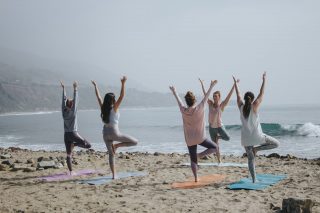While many of us are looking to science and even aesthetics for the fountain of youth, the answer to longevity has been found among populations living in the Blue Zones.
What are the Blue Zones?
Following research performed by Michel Poulain and Giani Pes in 2004, a group of researchers led by National Geographic Fellow Dan Buettner embarked on a journey to find out which regions of the world have the lowest rates of middle-age mortality.
They uncovered five areas that were virtually free of the disease and with numerous healthy residents that were living to age 100 and beyond. The researchers coined the term “Blue Zones” to describe these areas because they had drawn blue ink around them on a map. It’s important to note that these five places are not geographically close to each other, nor do their residents share common ethnicities or backgrounds.
These five places were:
- Okinawa, Japan
- Sardinia, Italy
- Nicoya, Costa Rica
- Icaria, Greece
- Seventh-day Adventists population in Loma Linda, California.
The Fountain of Youth
As the researchers investigated these five particular regions, they began to notice common trends, more so in regard to diet, social life, and level of physical activity.
We’ve selected some highlights from the study to help you create your own zone for longevity.
1. A plant-based diet
While there is no one specific diet that the inhabitants of these places share, their principles are generally the same.

Photo by Farhad Ibrahimzade on Unsplash
Aside from their diets being void of processed meats and junk food, as well as being rich in plenty of fruits and vegetables, these populations also eat legumes – which studies have shown help to lower mortality – whole grains, nuts, quality olive oil, herbs, fermented foods such as kefir and miso, grass-fed goat milk, homemade cheese, and sardines.
With regards to meat, while the Seventh-day Adventists in Loma Linda, California are strict vegetarians, the other communities only consume meat five times a month. With various studies showing the increased risk of heart disease and cancer, which comes from high meat consumption, it’s no wonder that the inhabitants of Lorna Linda live such long lives.
These foods provide a number of vital nutrients and minerals that can help prevent inflammation, heart disease, high cholesterol, diabetes, and even stroke.
Be sure to eat plenty of vegetables and fruits on a daily basis, healthy fats, nuts, legumes, and fermented foods and stay clear of refined sugars and packaged foods.
2. Enjoy a glass a day
Granted, there continues to be mixed evidence about the effect of alcohol consumption on mortality. However, residents of communities in the Blue Zones consume one to two daily glasses of red wine – which happens to be rich in antioxidants.
It’s important to note that the various studies that highlight the benefits of alcohol consumption also take into account other lifestyle factors such as diet and fitness.
3. Have a good social life
We all have those days when we’d rather be alone, myself included. That said, family and social ties can help promote longevity. Solitude and isolation can affect mortality by increasing cortisol (the stress hormone) and inflammation, which then increases the risk for chronic diseases. However, with family and community being such a big priority in Blue Zone areas, these risks are low.
The inhabitants of Dan Buettner’s Blue Zones study have strong social systems with multi-generational homes (old-age homes don’t exist), strong parent-child relationships, and wonderful spiritual communities. For one, Okinawans have moais, which is a group of people that remain connected their whole lives. They spend time talking, cooking, and supporting each other. On the other hand, on Saturdays, Seventh-day Adventists rest and socialize.
With the fast-paced lifestyle that is in the modern world, it may be difficult to find some downtime for yourself, let alone family members and friends. However, it can be done. Aside from regular family dinners, try setting aside regular night-outs with friends.
4. An active lifestyle

Photo by RF._.studio from Pexels
There’s no such thing as sedentary life among a population with longevity.
While they don’t have any gym memberships, these populations incorporate activities into their everyday lives. This includes gardening, hiking, walking, and even their chores including some form of activity, like raising farm animals. They also practice yoga, tai chi, and dancing. An active lifestyle is a sure way to relieve stress, improve heart health, as well as reduce the risk of chronic diseases.
5. Hara hachi bu
Hara hachi bu is a Japanese term that teaches one to eat until they are only 80% full. While the rest of the world tends to overeat. Research shows that when people stop eating before they are full, this helps reduce the risk of excess calories and weight gain. Moreover, foods consumed by those who live longer are rich in fiber and other nutrients. These foods are digested slowly, thus quickly triggering feelings of satiety.
Another dietary habit that these populations follow is fasting. Be it intermittent fasting, or other forms of fasting. This act can help in regards to weight management as well as lowering blood pressure and cholesterol.
6. Manage your stress
Stress is a natural part of life. However, chronic stress can lead to a number of fateful illnesses. Therefore, it’s important to practice good stress reduction techniques.
Aside from building a strong support network, these populations reduce stress by praying, taking walks, exercising, and meditating. It’s called downshifting. You can do the same but also learn to be mindful of taking on too much.
7. Maintaining a sense of purpose
Known as ikigai in Okinawa or plan de vida in Nicoya, having a life purpose has been linked with better mental health, as well as increased mortality. Essentially, you need a reason to wake up in the morning. Often finding this reason requires a deeply personal journey of self-discovery.
Establish your own health zone

Photo by Kaylee Garrett on Unsplash
By staying mindful of some key longevity principles of living, and finding your fit when it comes to a healthy lifestyle, you can make it your own and enjoy better health and longevity.
Make sure to find like-minded people who enjoy the same kind of lifestyle. People with whom you can spend time cooking, exercising, and socializing. A healthy lifestyle is meant to be shared. Once you know how enjoyable it is to live healthily, you will never want to have it any other way.
Find out more about the principles practiced in Blue Zones.





![women [longevity live]](https://longevitylive.com/wp-content/uploads/2020/01/photo-of-women-walking-down-the-street-1116984-100x100.jpg)










Something to aspire to although genetics also have an influence!